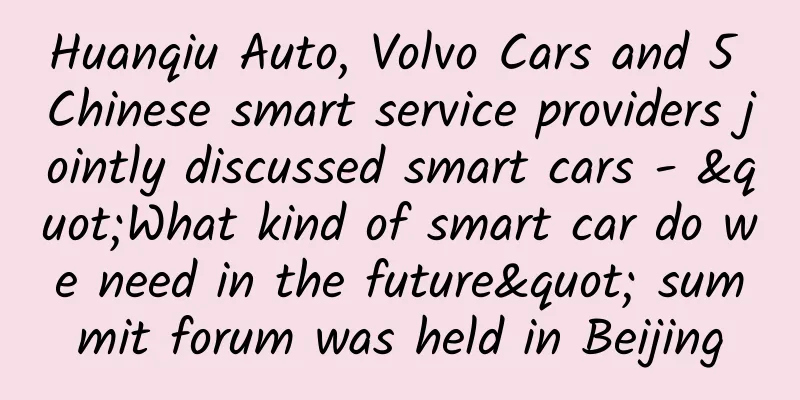Huanqiu Auto, Volvo Cars and 5 Chinese smart service providers jointly discussed smart cars - "What kind of smart car do we need in the future" summit forum was held in Beijing

|
On December 11, the "Open, Standard, and Safety - What kind of smart car do we need in the future" summit forum co-organized by Global Auto Group and Volvo Cars was held in Beijing. As more and more automobile companies have proposed to transform into "mobile travel service providers" in recent years, it means that automobile companies need to make disruptive changes in intelligence. The application of artificial intelligence technologies such as machine learning, natural language processing, and neural networks is considered by the outside world to be the key technology for disruptive changes in automobile intelligence. However, the complex in-vehicle operating system and closed system development environment not only hinder development efficiency, but also greatly reduce consumers' effective use of smart cars. At the 2017 Google I/O Developer Conference, global technology giant Google and Volvo Car Group jointly announced a partnership to jointly develop the next-generation automotive version of Android (Android embedded). This system completely breaks the shortcomings of the ordinary Android system that was previously criticized by the outside world, and at the same time completely realizes a series of issues that consumers are most concerned about when using smart cars, such as openness and security, and unifies the chaos of customized car systems based on different versions of Android systems. It is worth noting that Volvo Cars, as the first automobile company to use this system in China, will build a new open platform and car interconnection ecosystem based on the Chinese market, and will first work with leading domestic technology companies such as Alibaba Artificial Intelligence Laboratory, AutoNavi, and iFlytek to build the next-generation Volvo intelligent in-car interactive system based on the standard version of the car Android system, bringing the best and latest in-car intelligent interconnection services and experience to Chinese consumers. At this forum, Huanqiu Auto Group invited Volvo Cars, the first batch of partners in the development of the standard version of the Android system for cars, and experts related to smart cars to discuss smart cars around the topic of "What kind of smart car do Chinese consumers need?" Wu Yingqiu, Chairman and CEO of Huanqiu Auto Group, said that the intelligence of cars includes many aspects, which are reflected in energy, power, driving mode, active and passive safety systems, and human-computer interaction. The intelligence of cars should not only be a technical issue, but also a question of how to give car drivers and passengers a better experience. At the same time, he also said that today, the most representative experts and scholars from automobile companies, IT companies and the field of smart cars were invited to have a big discussion on the topic of future smart cars, and he also hoped that more Internet companies and car companies would work together to develop real smart cars with the thinking of "openness, security and innovation". The first domestic automaker to use the standard version of the Android system In order to achieve an open operating system, unified standards and a secure system environment, Volvo Cars Global and Google have launched a new cooperation. The two parties have built the next generation of intelligent in-vehicle interactive system based on the standard version of the Android system. The functions of this intelligent in-vehicle interactive system will be comparable to a smartphone. Not only can the system OTA be realized, but the application software in its intelligent in-vehicle interactive system can also be updated in real time. This cooperation has completely broken the past problems of the in-vehicle system, such as complexity, confusion, closure and insecurity. Data shows that at present, the main in-vehicle operating systems are WinCE, Linux, and QNX. Among them, the WinCE operating system is the most mature in-vehicle operating system. However, with the increasing demand for networking and other user needs, and the gradual maturity of other operating systems, WinCE has gradually withdrawn from the stage of intelligent operating systems. QNX is an embedded system under BlackBerry. Although it has a high market usage rate, it is limited by the high cost of adaptation on the application side, and there are a series of problems such as high cost on consumer terminals. In addition, the Linux operating system also has a certain degree of recognition in the market due to its reliability and network design, but since all application software needs to be developed independently, cost and time are a major problem for companies using it. Zhu Xichan, a professor at the School of Automotive Engineering of Tongji University, said that he believes that automobiles must face changes under the conditions of technological change, energy revolution, Internet of Everything, and artificial intelligence. Among them, the first problem that smart cars solve is road traffic safety. In response to the "struggle" between the European and American auto industries to develop smart cars, China is taking a third route to develop smart cars, which is to open platforms for mutual support. Yuan Xiaolin, Global Senior Vice President of Volvo Car Group, President and CEO of Asia Pacific, said that cars are evolving from transportation to super-intelligent terminals that connect big data and digital ecosystems. The future development of smart cars must put consumer needs at the core and must be able to achieve fast, accurate and comprehensive responses, which requires not only a convenient, efficient and standardized operating platform, but also an open in-car smart ecosystem built on the platform. Volvo Cars has always been open and inclusive, and has worked with partners in various fields to create the warmest and highest-quality in-car digital life experience for consumers. In Volvo's view, the reason for choosing Android operating system as the underlying operating system of the new generation of intelligent in-vehicle interactive system is that the Android system has an open and friendly ecosystem, with a wide range of users, services and application developers, and development based on the standard version of the automotive Android operating system can quickly realize service updates and iterations. In global markets outside of China, Volvo Cars' next-generation intelligent in-car interactive system will be directly integrated into Google's complete ecosystem, including Google Voice Assistant, Google Play, Google Maps and other Google services. In China, Volvo Cars will be the first car company to use the standard version of the Android system. It will take the lead in the Chinese market to work with leading partners in various fields in an open manner to truly create an open, inclusive, secure, unified and self-learning and updating smart car service ecosystem. What does Volvo want to change about smart cars? At the forum, Wang Xiaoming, head of the China Innovation Strategy and Policy Research Center/Industrial Technology Group of the Major Task Management Integration Department of the Institute of Science and Technology Strategy Consulting of the Chinese Academy of Sciences, said that the electrification, intelligence, networking and sharing of automobiles are the general direction of the development of the automobile industry. The four new trends of automobiles are mutually influential and interrelated, and there are also correlations and synergies between them. In addition, the four new trends of automobiles have driven the development of the automobile industry and new telecommunications technology facilities, environment and cities in terms of transportation, energy and urban development. It is understood that Volvo Cars is committed to solving three problems in automotive intelligent systems by cooperating with Google to develop a standardized automotive version of the Android operating system. 1. Simplify and simplify, break the duplication of front-end software design and adaptation problems caused by different versions in the past, and improve the convenience of consumers' experience in smart car systems. The standard version of Android system for cars combines the advantages of other versions of the system with the underlying data of the car to develop a system that is truly suitable for car use. Second, unlike the traditional version of Android system, the standardized car version of Android system will solve a series of traditional Android system problems such as freezing and security. In the past, there were many versions of Android system, which left the impression of freezing and poor performance in the automotive aftermarket. According to data, the standard version of Android system for cars jointly developed by Volvo and Google uses the Android system to communicate with each ECU on the vehicle bus and the car computer. This also means that both the on-board computer and the infotainment host on the vehicle use the Android system for communication, allowing the entire vehicle to develop intelligent network and ADAS systems with the same communication standards, which is guaranteed in terms of safety. 3. The new standard version of Android system for cars is open and continuously iterative, and is compatible with different software, giving consumers more choices in the use process. At the same time, this system supports automatic software iteration, improving the update efficiency of smart cars. In the past, in-vehicle operating systems developed based on the Android system were widely used in the aftermarket car market. The numerous versions and models could not fundamentally solve problems such as frequent upgrades and long startup time. The standardized automotive Android operating system can solve these problems well and will be more convenient to use. Building an open smart car ecosystem in China Unlike its overseas cooperation with Google to develop front-end applications, Volvo Cars adopts an open cooperation model for the domestic market, and is the first to work with several corporate partners representing cutting-edge technologies in different fields of smart cars, such as AutoNavi Maps, iFlytek, and Alibaba AI lab, to create an open smart car service ecosystem for the Chinese market. At the forum, Qian Xue, Vice President of Alibaba Group and General Manager of Alibaba Artificial Intelligence Laboratory, believes that no matter whether the external or internal environment changes, or whether consumers and people in the current era change, there are several points that will not change in the future. The first is technology-driven, the second is user-oriented, and the third is to embrace the new changes brought about by all industries with an open mind. It is understood that Volvo has cooperated with Alibaba's artificial intelligence laboratory to connect the Tmall Genie ecosystem into the car. In the in-car scenario, the next-generation intelligent in-car interactive system will be connected to the complete service ecosystem of Tmall Genie (including media, online reservation services, IoT control, etc.), and the service content will be updated in real time with Alibaba's strategy. Regarding the future smart car navigation, Wei Dong, President of AutoNavi's Automotive Division, shared AutoNavi's future vision. Wei Dong pointed out that in the future, smart cars will become essential tools and service products in life, just like smartphones. AutoNavi solves the pain points of past car company cooperation and fully demonstrates its customer service capabilities on vehicles. AutoNavi solves user needs and pain points through technical capabilities and rapid product iteration. It truly realizes integration with cars, making travel more pleasant, convenient and safe. In the future, Amap will carry out high-end customization and adaptation development for Volvo's new infotainment platform based on Amap Car Edition, contributing EHP algorithm for active safety. In addition, Amap will cooperate with Volvo's electrification strategy to provide electric vehicle endurance, navigation planning and other algorithms for future Volvo electric vehicles. At the forum, Wu Bin, Director of IOT Cloud Service of Huawei CBG Cloud Service Department, believed that in the era of cloud + AI, people and cars can achieve closer connection. In Huawei's solution, it will be carried out from two aspects: one is the interaction between people and cars, through the connection of mobile phones, car machines, and the connection of IOT devices at home; the other is to serve car owners through in-vehicle infotainment technology. In the field of speech recognition, Liu Junfeng, vice president of iFlytek and general manager of the intelligent automobile business unit, said that over the years, more and more car manufacturers no longer talk about the three major components, but about artificial intelligence; the newly built centers are no longer design centers or mechanical centers, but software development centers. The gradual change in nature represents that car companies are gradually changing from production companies to intelligent travel companies and intelligent logistics companies. iFlytek will provide Volvo Cars with in-car system speech recognition products to realize in-car (air conditioning, telephone, media, etc.) functions and navigation voice control. Yuan Xiaolin said that AutoNavi, iFLYTEK and Alibaba AI lab are Volvo Cars' first round of smart car partners in the Chinese market. In the future, Volvo Cars will seek more partners based on the standard version of the Android system for cars. The goal is to always choose the best partners in China and bring the best services and experiences to Chinese consumers. As a winner of Toutiao's Qingyun Plan and Baijiahao's Bai+ Plan, the 2019 Baidu Digital Author of the Year, the Baijiahao's Most Popular Author in the Technology Field, the 2019 Sogou Technology and Culture Author, and the 2021 Baijiahao Quarterly Influential Creator, he has won many awards, including the 2013 Sohu Best Industry Media Person, the 2015 China New Media Entrepreneurship Competition Beijing Third Place, the 2015 Guangmang Experience Award, the 2015 China New Media Entrepreneurship Competition Finals Third Place, and the 2018 Baidu Dynamic Annual Powerful Celebrity. |
Recommend
Did the “earthquake cloud” predict the Texas earthquake? Here comes the August science rumor list →
1. "Earthquake Cloud" predicted the ear...
The brand marketing and communication code of "the pride of domestic products"
Not long ago, the Xinjiang cotton incident caused...
Mate7 is popular, so Huawei's problem comes
It is no exaggeration to say that the emergence o...
Android application source code for smart agriculture
Source code introduction This example is an Andro...
This AR technology will "dissect" you alive for others to see
Generally speaking, if a physical therapist wants...
Product Operations: How to use data analysis to drive product user growth?
Some time ago, I saw a post asking: Can data anal...
Shen Mengchen's first car for taking care of her baby, AION S MAX is available on the market starting at 149,900 yuan
In the past, when a man became a father, he would...
It is beautiful and long-lived, but it brings disaster to its life
Three hundred million years have passed. Since ap...
How does Keep create popular content? Explain clearly a set of operating models!
A few days ago, when I was watching TV, I found t...
When it comes to obesity, boys are more concerned than girls! It makes sense...
According to statistics from the World Health Org...
Cut the meat! Who did the big companies get rid of in 2015?
[[161006]] At first, it was a popular commodity t...
China Unicom's 4G strategy confirmed: centralized operation and control of marketing in various regions
At the recent China Unicom Dual 4G Leading Plan I...
6 secrets to achieve explosive growth at low cost
Why should I spread your activity? Why should I b...
How can an application app avoid becoming a hit and then dying out?
Face Meng has become popular. Whether it is prais...
The "fission" battle between Luckin Coffee and Lian Coffee: Who is the growth king?
Two years ago, when people talked about drinking ...









